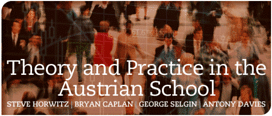In a later entry, I will reply directly to the questions Bryan has raised in his most recent. I will do so because he asked nicely, not because I want to answer them. I don’t want to answer his questions because I have come, in the last few years, to really dislike the whole philosophical debate around the methodology of economics, very much including the internecine debates among Austrians and the debates between Austrians and their (sympathetic) critics. I had to overcome my distaste in order to write the lead essay for this forum, and I did so mostly so that I could eventually gripe about methodology. The reason I dislike these issues so much is that I think that many discussions of methodology get matters backward.
Too many Austrians argue as if we must figure out the right methodology (and method) for economics first, then go out and “do” economics. I think that’s the wrong way to conceive of the issue. One reason it’s so wrong is that, as George Selgin points out in his entry, there are multiple Ludwig von Miseses when it comes to pronouncements about these issues. I very much intentionally presented a view that emphasized one of those Miseses, but George is quite right to point to the others. The result is that these debates get bogged down in “what did Mises really mean?” squabbles. I have been guilty of playing this game myself in the past, which distracts us from actually doing good (Austrian) economics. If nothing else, I hope that my original entry can persuade some critics that the anti-empirical reading George identifies as being more the rule than the exception among self-described Austrians is not the only possible Mises.
Instead of fighting over what Mises really thought the right way to do economics was, let’s go at this another way: method should follow from the pre-analytical vision and the analytical propositions it generates. That is, method comes last, not first. The Austrian tradition from Menger to Mises to Hayek to Kirzner shares a broad pre-analytical vision (to use Schumpeter’s helpful term) about the nature of economies and importance of subjectivism, knowledge, and spontaneous ordering processes. From that vision comes a series of more specific substantive propositions about how this vision manifests itself in economic analysis (see Boettke’s list, which I noted earlier). If we want to make use of those propositions to understand real-world phenomena, it should be those propositions that guide us as to what sorts of empirical observations and evidence are needed to demonstrate the usefulness of Austrian economics in rendering the world intelligible.
More precisely: the world is full of puzzles that we do not understand. Austrians think those analytical propositions are necessary (though not sufficient) for good explanations of those puzzles. What sorts of arguments and evidence are needed to offer persuasive accounts of those puzzles in ways that render them no longer puzzling? Different puzzles will require different propositions, which will require different methods and empirical evidence to render them intelligible.
One way to put this argument is that what makes a piece of economics “Austrian” is not so much the particular method that is employed, or even the philosophy of science that guides the investigation (as if every economist has thought about this), rather it is the substantive propositions about the economy that are being deployed and/or argued for in that piece of work. If, as George rightly argues, there are times we need to do statistical or econometric work to show the magnitude of certain empirical claims in applied economics, then do it. Other kinds of work might be less amenable to such an approach, so in those cases we should use other methods. Austrians need to stop putting the methodological cart before the analytical horse.
This is not to say that we should ignore methodology completely. As Pete Boettke points out, Austrians will have to mount a defense of why we do things the way we do. My point is simply that the defense of our methods should not come before our work, but rather alongside it. If we come up with good explanations for the profession’s puzzles, then our defense of why that sort of explanation is the right kind will be that much more persuasive.
One beneficial side effect of proceeding this way is that we can dispense with the endless debates (and again, I include myself here) over what Mises really meant by “praxeology.” There are multiple readings of Mises out there, and rather than fight over which one is (a priori?) correct, let’s instead find things in the real world that puzzle economists and others, and then make use of Austrian theoretical claims to provide persuasive explanations for those puzzles, using the methods appropriate to both the theory and the puzzle. Isn’t that what economics, regardless of what adjective we put in front of it, should be doing?

